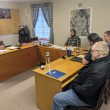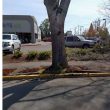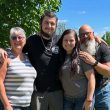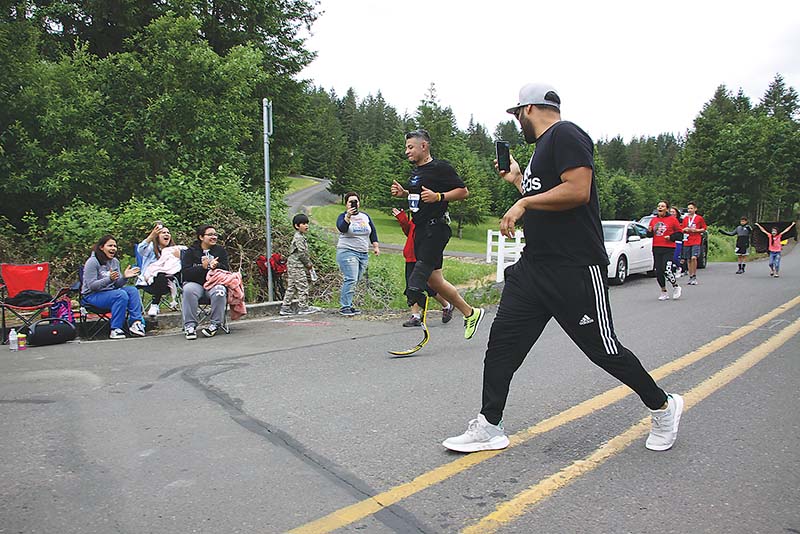When Abraham “Abe” Andrade ran down a steep hill toward cheering family members during the Hero Half Marathon on Memorial Day weekend this year, his accomplishment was more than just honoring veterans.
It was a personal highlight as well.
Andrade’s left leg didn’t end in a shoe. He was running on an Össur carbon fiber blade – which had arrived the day before.
At that point, Andrade was closing in on the end of the half marathon, 13.1 miles of rolling hills through the Sweet Home countryside.
“It was my first time running, my first run ever,” he recalled last week as he sat in his office at the Edward C. Allworth Veterans’ Home in Lebanon.
Andrade, who turned 33 June 1, has worked as assistant administrator at OVH since April of 2017.
That’s when he first got the bug to run, he said. Megan Eddy, an OVH recreational therapy manager, announced at a staff meeting that she was planning to run in the Hero Half.
The race was founded in 2013 by local attorney Rachel Kittson-MaQatish in honor of Marine Cpl. Keaton Coffee of Boring, who was killed in 2012. The Hero Half raises money for scholarships and provides encouragement and support for Gold or Silver Star families – those who have members killed or wounded in military service. The annual event includes an 8K (five mile) run and 1.3 mile run/walk in addition to the half marathon, held the Saturday before Memorial Day at Community Chapel, a church in Sweet Home.
“I thought it was a great cause, a great reason,” Andrade said. “I kind of took it as a challenge. Since I had worked here for a year, I knew about the sacrifices veterans and their families make.”
He signed up and, he said, started shedding weight.
There were challenges. After two months of getting in shape, his prosthetic no longer fit.
He needed a new one, so in the interim he started training with “kind of a dynamic foot that I had.”
He talked with his doctor about getting a blade and mentioned it in a Facebook post, which led to the establishment of a GoFundMe page.
He’d never had a blade before – they cost about $30,000 and “insurance doesn’t pay for that stuff,” he said.
“Friends and family had fund-raisers and they helped me pay for that foot. That added commitment to my training.”
Also, he said, he had a friend who had lost her husband, Army Sgt. Jorge Torres, in combat in 2013.
“I asked my friend Stephanie Torres if she would be OK with me honoring him through this run. She was very excited. She came out there with her two boys.
“So every time I thought about giving up, I thought about those guys.”
Andrade arrived in Salem from Mexico when he was 13, after he’d been run over by a truck.
“We came up because of my medical condition,” he said. “I have family up here who said, ‘Hey, if you come up here, technology’s better, you can get some help.”
His father procured green cards for the family – parents, three boys and three girls – and they came, he said.
He graduated from McKay High School in 2003.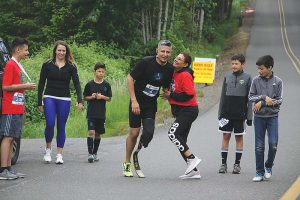
In 2006 he visited a friend who worked at Marion Estates nursing home.
“That was my first interaction with the elderly, really, just as far as witnessing the challenges of Alz- heimer’s, dementia.”
He got interested and asked his friend what it would take to become a certified nursing assistant so he could work at a care home.
“He told me about it and I just kind of made a commitment, right there.”
He worked as a CNA for two years for a couple of companies in the Willamette Valley, and noticed “challenges” common to nursing homes – “staff engagement, retaining, hiring competent people.
“I’ve always been the kind of person, even with other people, ‘if there’s a concern, let’s work on it.’ My concern was that we were short on staff, that we needed better care for our residents, so I went to the administrator and asked, ‘How can I help?’ She gave me a position as a staffing coordinator in human resources. So I went from CNA to doing that.
“Then I also realized the success of staff, as caregivers, depends on effective leadership, so I went to my administrator and I asked her, ‘What do I have to do to do what you do now?’ She told me and I decided to go back to school.”
That was 2009. He was married when he returned to school, graduating from the University of Phoenix in 2014.
Now a licensed nursing home administrator, he moved with his wife Krista and son to La Grande, where he became executive director of a 76-bed facility that included various specialized care units before moving to OVA a year ago.
While in eastern Oregon he also discovered the joys of hunting, particularly elk, bagging his first bull last year.
With his parents aging and his now four children getting older, Andrade said he and his wife had gotten interested in returning to the Willamette Valley when he came across the job opening for OVA.
He wanted to work with veterans, he said.
“I couldn’t join,” he said.
He discovered that he and Executive Director Kelly Odegaard had worked at the same facility previously, Odegaard as administrator and Andrade as a CNA.
“There were a lot of people. I remembered him.”
Plus, he said, the facility he managed in La Grande had also been Odegaard’s first administrator position.
“We had a lot of things in common. Just everything lined up.
“Kelly is one of the best in my opinion. Working with him, I was kind of new as an administrator. I thought I could certainly learn from someone who’s been doing this for a long time.
“Looking back, it was definitely the right decision. I love working with the veterans here.”
Andrade said he intends to keep running.
“I had no goals other than to finish and maybe motivate someone else,” he said of the Hero Half. “That’s actually why I want to keep running.”
Plus, during the process of getting his blade, Andrade discovered that veterans have difficulty procuring such equipment.
He said he’s had a lot of experience with prosthetics, serving as a “test person” for Shriners Children’s Hospital as a teen, “before products came out. I would test them at home for a couple of weeks, then come back and tell a bunch of doctors and companies from everywhere what I thought about that.
“Then I got to keep the leg, the foot.”
Prosthetics equipment has improved “a lot, definitely,” he said, noting that the foot he was wearing during a conversation with a visitor had “deflection” capabilities that made it “much more natural.”
Andrade said he’s never let his disability stop him.
“I’ve always pushed myself to do whatever I wanted,” he said.
And he has plans for his newfound running career.
“Eventually, what I would like to do is maybe partner up with an orthotics clinic who’s willing to sponsor a veteran into getting a running leg. What I would do in exchange is train with him and promote the clinic.”

